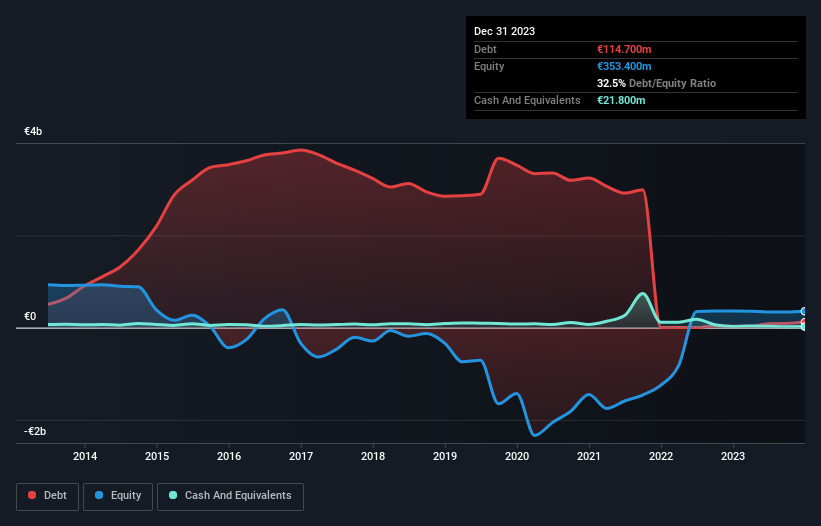Howard Marks put it nicely when he said that, rather than worrying about share price volatility, 'The possibility of permanent loss is the risk I worry about... and every practical investor I know worries about.' It's only natural to consider a company's balance sheet when you examine how risky it is, since debt is often involved when a business collapses. We can see that Orrön Energy AB (publ) (STO:ORRON) does use debt in its business. But should shareholders be worried about its use of debt?
What Risk Does Debt Bring?
Generally speaking, debt only becomes a real problem when a company can't easily pay it off, either by raising capital or with its own cash flow. Ultimately, if the company can't fulfill its legal obligations to repay debt, shareholders could walk away with nothing. However, a more usual (but still expensive) situation is where a company must dilute shareholders at a cheap share price simply to get debt under control. Of course, plenty of companies use debt to fund growth, without any negative consequences. The first thing to do when considering how much debt a business uses is to look at its cash and debt together.
View our latest analysis for Orrön Energy
What Is Orrön Energy's Debt?
As you can see below, at the end of December 2023, Orrön Energy had €114.7m of debt, up from €28.8m a year ago. Click the image for more detail. However, it does have €21.8m in cash offsetting this, leading to net debt of about €92.9m.

How Healthy Is Orrön Energy's Balance Sheet?
We can see from the most recent balance sheet that Orrön Energy had liabilities of €13.7m falling due within a year, and liabilities of €133.6m due beyond that. On the other hand, it had cash of €21.8m and €1.70m worth of receivables due within a year. So it has liabilities totalling €123.8m more than its cash and near-term receivables, combined.
This is a mountain of leverage relative to its market capitalization of €195.7m. This suggests shareholders would be heavily diluted if the company needed to shore up its balance sheet in a hurry. The balance sheet is clearly the area to focus on when you are analysing debt. But it is future earnings, more than anything, that will determine Orrön Energy's ability to maintain a healthy balance sheet going forward. So if you're focused on the future you can check out this free report showing analyst profit forecasts.
In the last year Orrön Energy wasn't profitable at an EBIT level, but managed to grow its revenue by 110%, to €28m. So its pretty obvious shareholders are hoping for more growth!
Caveat Emptor
While we can certainly appreciate Orrön Energy's revenue growth, its earnings before interest and tax (EBIT) loss is not ideal. Indeed, it lost €14m at the EBIT level. When we look at that and recall the liabilities on its balance sheet, relative to cash, it seems unwise to us for the company to have any debt. So we think its balance sheet is a little strained, though not beyond repair. For example, we would not want to see a repeat of last year's loss of €8.0m. So in short it's a really risky stock. When I consider a company to be a bit risky, I think it is responsible to check out whether insiders have been reporting any share sales. Luckily, you can click here ito see our graphic depicting Orrön Energy insider transactions.
Of course, if you're the type of investor who prefers buying stocks without the burden of debt, then don't hesitate to discover our exclusive list of net cash growth stocks, today.
New: AI Stock Screener & Alerts
Our new AI Stock Screener scans the market every day to uncover opportunities.
• Dividend Powerhouses (3%+ Yield)
• Undervalued Small Caps with Insider Buying
• High growth Tech and AI Companies
Or build your own from over 50 metrics.
Have feedback on this article? Concerned about the content? Get in touch with us directly. Alternatively, email editorial-team (at) simplywallst.com.
This article by Simply Wall St is general in nature. We provide commentary based on historical data and analyst forecasts only using an unbiased methodology and our articles are not intended to be financial advice. It does not constitute a recommendation to buy or sell any stock, and does not take account of your objectives, or your financial situation. We aim to bring you long-term focused analysis driven by fundamental data. Note that our analysis may not factor in the latest price-sensitive company announcements or qualitative material. Simply Wall St has no position in any stocks mentioned.
About OM:ORRON
Adequate balance sheet with very low risk.
Similar Companies
Market Insights
Community Narratives



